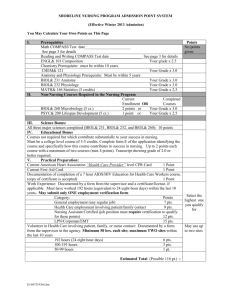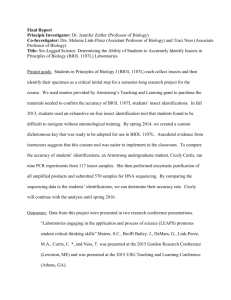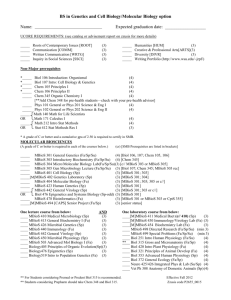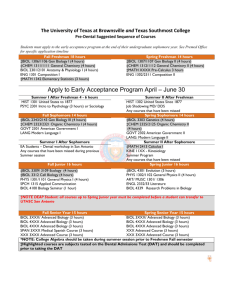Biology Course Descriptions – Summer School 2015 MAYMESTER
advertisement
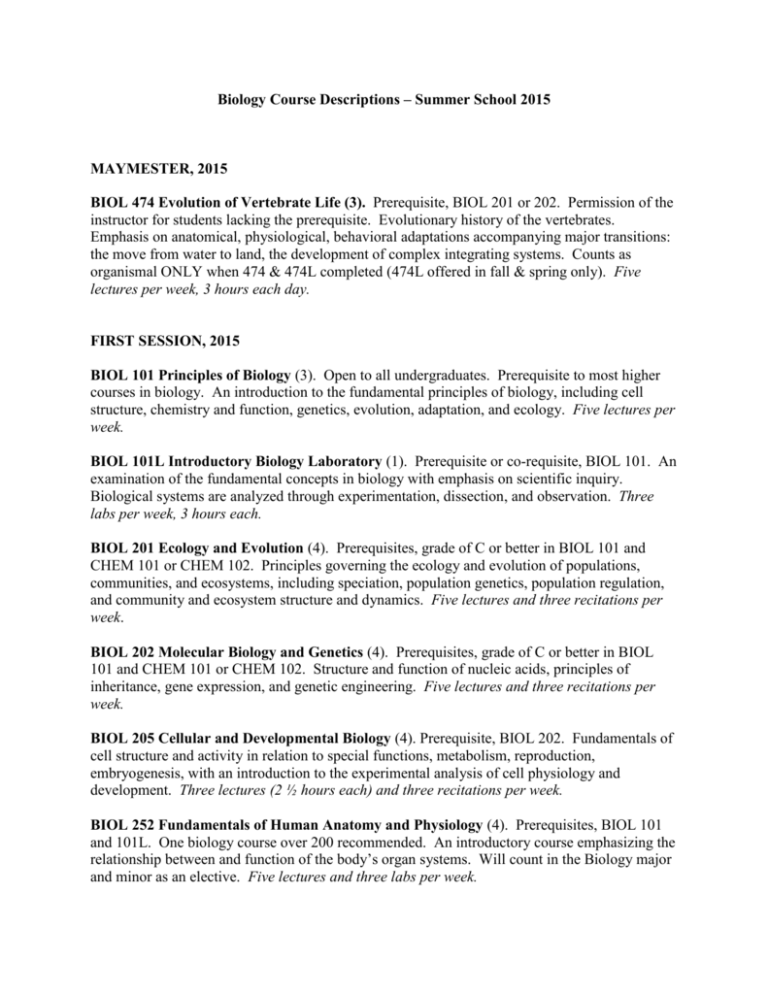
Biology Course Descriptions – Summer School 2015 MAYMESTER, 2015 BIOL 474 Evolution of Vertebrate Life (3). Prerequisite, BIOL 201 or 202. Permission of the instructor for students lacking the prerequisite. Evolutionary history of the vertebrates. Emphasis on anatomical, physiological, behavioral adaptations accompanying major transitions: the move from water to land, the development of complex integrating systems. Counts as organismal ONLY when 474 & 474L completed (474L offered in fall & spring only). Five lectures per week, 3 hours each day. FIRST SESSION, 2015 BIOL 101 Principles of Biology (3). Open to all undergraduates. Prerequisite to most higher courses in biology. An introduction to the fundamental principles of biology, including cell structure, chemistry and function, genetics, evolution, adaptation, and ecology. Five lectures per week. BIOL 101L Introductory Biology Laboratory (1). Prerequisite or co-requisite, BIOL 101. An examination of the fundamental concepts in biology with emphasis on scientific inquiry. Biological systems are analyzed through experimentation, dissection, and observation. Three labs per week, 3 hours each. BIOL 201 Ecology and Evolution (4). Prerequisites, grade of C or better in BIOL 101 and CHEM 101 or CHEM 102. Principles governing the ecology and evolution of populations, communities, and ecosystems, including speciation, population genetics, population regulation, and community and ecosystem structure and dynamics. Five lectures and three recitations per week. BIOL 202 Molecular Biology and Genetics (4). Prerequisites, grade of C or better in BIOL 101 and CHEM 101 or CHEM 102. Structure and function of nucleic acids, principles of inheritance, gene expression, and genetic engineering. Five lectures and three recitations per week. BIOL 205 Cellular and Developmental Biology (4). Prerequisite, BIOL 202. Fundamentals of cell structure and activity in relation to special functions, metabolism, reproduction, embryogenesis, with an introduction to the experimental analysis of cell physiology and development. Three lectures (2 ½ hours each) and three recitations per week. BIOL 252 Fundamentals of Human Anatomy and Physiology (4). Prerequisites, BIOL 101 and 101L. One biology course over 200 recommended. An introductory course emphasizing the relationship between and function of the body’s organ systems. Will count in the Biology major and minor as an elective. Five lectures and three labs per week. BIOL 272 Local Flora (4). Prerequisites, BIOL 101 and 101L. Open to all undergraduates. North Carolina’s flora: recognition, identification, classification, evolution, history, economics, plant families, ecology, and conservation. Five lectures and three labs per week. BIOL 278 Animal Behavior (3). Prerequisites, BIOL 101 and 101L. Introduction to animal behavior with emphases on the diversity and adaptation of behavior in natural conditions. Five lectures per week. BIOL 278L Animal Behavior Laboratory (1). Prerequisite or co-requisite, BIOL 278. Techniques of observation and experiments in animal behavior. Three labs per week. BIOL 291 Teaching Apprentice in Biology (1). Permission and application required. 3.0 or higher in course taught.. Experience includes preparations, demonstrations, assistance, and attendance at weekly meetings. Apprentices will not be involved in any aspects of grading. May be repeated for credit. Three labs per week, 3 hours each. BIOL 352 Human Anatomy and Physiology Part I (4) Prerequisites, BIOL 101 and 101L. BIOL 205 recommended. A comprehensive study of the structure and function of the human body. Includes comprehensive study of tissues and the integumentary, skeletal, muscular, and nervous systems. This course, along with BIOL 353 are offered in Summer School only and are designed for students who will be applying to professional schools requiring two semester of A&P. BIOL 352 only may count in the Biology major or minor as an elective. Cannot be taken in addition to BIOL 252. Five lectures and three labs per week. BIOL 395 Undergraduate Research in Biology (1-3). Prerequisites, BIOL 201 or BIOL 202, an overall 3.0 grade point average, and permission of a faculty research director. Biology majors only. Laboratory study addressing biological questions. Requires written report. Repeatable for up to six credit hours. Obtain application from 213 Coker Hall. New application required for each summer session. Applications due by the first day of classes. During one summer school semester, 1 credit hour is equal to 45 hours of research, 2 credits = 90 hours of research and 3 credits = 135 hours of research. Normally, students should take BIOL 395 for 3 credit hours. Requests to register for 1-2 hours requires permission of the Biology Research Director, and will granted only for special circumstances. BIOL 449 Introduction to Immunology (3). Prerequisites, BIOL 205. Permission of the instructor for students lacking the prerequisites. This course provides a general overview of the evolution, organization, and function of the immune system. Instruction will be inquiry-based with extensive use of informational and instructional technology tools. Four lectures per week. BIOL 455 Behavioral Neuroscience (3). Prerequisite, BIOL 205. Permission of the instructor for students lacking the prerequisite. The neurobiological basis of animal behavior at the level of single cells, neural circuits, sensory systems, and organisms. Lecture topics range from principles of cellular neurobiology to ethological field studies. Five lectures per week. SECOND SESSION, 2015 BIOL 101 Principles of Biology (3). Open to all undergraduates. Prerequisite to most higher courses in biology. An introduction to the fundamental principles of biology, including cell structure, chemistry and function, genetics, evolution, adaptation, and ecology. Five lectures per week. BIOL 101L Introductory Biology Laboratory (1). Prerequisite or co-requisite, BIOL 101. An examination of the fundamental concepts in biology with emphasis on scientific inquiry. Biological systems are analyzed through experimentation, dissection, and observation. Three labs per week, 3 hours each. BIOL 201 Ecology and Evolution (4). Prerequisites, grade of C or better in BIOL 101 and CHEM 101 or CHEM 102. Principles governing the ecology and evolution of populations, communities, and ecosystems, including speciation, population genetics, population regulation, and community and ecosystem structure and dynamics. Five lectures and three recitations per week. BIOL 202 Molecular Biology and Genetics (4). Prerequisites, grade of C or better in BIOL 101 and CHEM 101 or CHEM 102. Structure and function of nucleic acids, principles of inheritance, gene expression, and genetic engineering. Five lectures and three recitations per week. BIOL 205 Cellular and Developmental Biology (4). Prerequisite, BIOL 202. Fundamentals of cell structure and activity in relation to special functions, metabolism, reproduction, embryogenesis, with an introduction to the experimental analysis of cell physiology and development. Five lectures and three recitations per week. BIOL 252 Fundamentals of Human Anatomy and Physiology (4). Prerequisites, BIOL 101 and 101L. One biology course over 200 recommended. An introductory course emphasizing the relationship between and function of the body’s organ systems. Will count in the Biology major and minor as an elective. Five lectures and three labs per week. BIOL 278 Animal Behavior (3). Prerequisites, BIOL 101 and 101L. Introduction to animal behavior with emphases on the diversity and adaptation of behavior in natural conditions. Five lectures per week. BIOL 278L Animal Behavior Laboratory (1). Prerequisite or co-requisite, BIOL 278. Techniques of observation and experiments in animal behavior. Three labs per week. BIOL 291 Teaching Apprentice in Biology (1). Permission and application required. 3.0 or higher in course taught.. Experience includes preparations, demonstrations, assistance, and attendance at weekly meetings. Apprentices will not be involved in any aspects of grading. May be repeated for credit. Three labs per week, 3 hours each. BIOL 353 Human Anatomy and Physiology Part II (4) Prerequisite, BIOL 352. Studies the structure, function, and development of the human body: endocrine, cardiovascular, lymphatic/immune, respiratory, digestive, urinary, reproductive systems. Can be used as an allied science elective but not a biology course for the major. This course, along with BIOL 352 are offered in Summer School only and are designed for students who will be applying to professional schools requiring two semester of A&P. BIOL 353 may NOT count in the Biology major or minor as an elective, but may be used as an Allied Science course. Cannot be taken in addition to BIOL 252. Five lectures and two labs per week. BIOL 395 Undergraduate Research in Biology (1-3). Prerequisites, BIOL 201 or 202, an overall 3.0 grade point average, and permission of a faculty research director. Biology majors only. Laboratory study on a selected topic. A final written report is required in each session. May be repeated for a total of no more than 6 credit hours. Obtain application from 213 Coker Hall. New application required for each summer session. Application due by the first day of classes. During one summer school session, 1 credit hour is equal to 45 hours of research, 2 credits = 90 hours of research and 3 credits = 135 hours of research. Normally, students should take BIOL 395 for 3 credit hours. Requests to register for 1-2 hours requires permission of the Biology Research Director, and will be granted only for special circumstances. BIOL 450 Introduction to Neurobiology (3). Prerequisite, BIOL 205. Survey of neurobiological principles in vertebrates and invertebrates, including development, morphology, physiology, and molecular mechanisms. Three lectures (2 1/2 hours each) per week.



